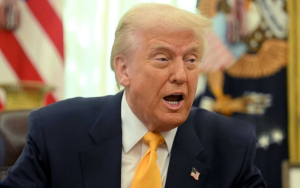The Defense Digital Service, a key tech unit behind U.S. military innovation and Ukrainian support tools, will shut down after mass resignations.
Others are reading now
The Defense Digital Service (DDS), often referred to as the Pentagon’s “nerd SWAT team,” is set to shut down after nearly all of its members handed in their resignations, according to a report by Politico.
The resignations come amid pressure from a new Department of Government Efficiency (DOGE), led by entrepreneur Elon Musk, which was launched under the directive of President Donald Trump.
The DDS was established in 2015. The department was a specialized unit tasked with bringing Silicon Valley-style innovation into the U.S. Department of Defense.
Over the years, the team developed cybersecurity tools, anti-drone systems, software for humanitarian missions, and even databases used by Ukrainian forces in their defense against Russia’s invasion.
Also read
Mass Resignations and the End of an Era
Current DDS Director Jennifer Hay will step down on May 1, and 11 of the team’s 14 members have accepted a compensation package offered to federal employees willing to leave under the Trump administration’s downsizing initiative.
Without its core staff, the DDS will cease to function as a standalone entity.
“Simply put: we have a choice between dying quickly and dying slowly,” Hay said, referring to the difficult decision to step down.
Though the Pentagon has not officially commented on the internal upheaval, it confirmed that DDS functions would be “absorbed” into the Office of Digital and Artificial Intelligence (ODAI), an existing branch under which DDS had been operating.
President Trump’s appointment of Elon Musk as a “special government employee” tasked with auditing and reforming the federal workforce has sparked intense controversy.
Musk’s Department of Government Efficiency is reportedly conducting aggressive audits and demanding access to classified digital systems.
Musk has claimed the effort will uncover “hundreds of billions of dollars” in fraud and waste, particularly within military spending.
“Let’s audit the military. Let’s audit the military,” Trump said during the announcement.
However, critics within the Department of Defense and other agencies argue that Musk’s involvement has so far lacked transparency, direction, or any real focus on innovation.
“No mention of using AI, no mention of efficiency. What they’re doing is destroying everything,” one former Pentagon official told Politico anonymously.
DDS’s Legacy: From Ukraine to Counter-Drone Warfare
Before its abrupt dismantling, the DDS had built a reputation as a lean, agile team solving urgent national security problems using cutting-edge tech. Highlights of its work include:
- Cybersecurity defense systems for key military assets
- Open-source databases used by Ukrainian forces and humanitarian groups
- Software platforms for U.S. troop logistics
- Drone detection and mitigation tools now in use in several operational theaters
These innovations made DDS a model for how government could work with the tech industry.
Staffed by experts with backgrounds at companies like Google and Amazon, the unit operated more like a startup than a traditional federal agency.
While the Pentagon claims DDS operations will continue under the ODAI, insiders suggest that the disbandment of the team and loss of institutional knowledge could take years to recover from—if ever.



